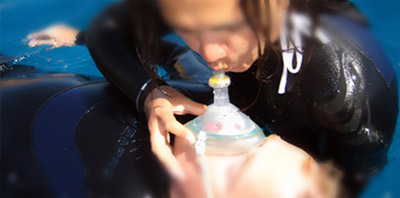FIRST AID FOR ALL SPORTS ENTHUSIASTS

What would you do if you witnessed any of these emergency situations?
- A scuba diver is found on the surface unconscious and
not breathing.
- A water skier collides with a boat, is knocked unconscious
and is lying face down in the sea.
- At an amateur football match, a tackle results
in a fractured leg.
- A man suffers a heart attack whilst playing squash.
- During a karate sparring bout, a contestant is
knocked out and lies motionless on the floor.
- A group of cyclists are involved in a road traffic accident
resulting in a variety of injuries including severe bleeding.
- At the gym, someone pulls a muscle while using free weights.
- A Skateboarder attempts a complex stunt and is thrown head first into a brick wall.
- 80% of all accidents resulting from sports injuries affect limbs,
mostly in the lower limbs. These include fractures, bruising, strains, sprains,
abrasions and lacerations. Injuries to the skull, thorax or abdomen tend to account
for the low mortality rates.
- In some countries, damage to the spinal cord in sporting accidents
accounts for between 3 to 12% of injuries. The most frequent causes are, rugby football,
mountaineering, gymnastics, shallow water diving and horse-riding.
- Across the USA and Europe, a high percentage of hospital emergency room
incidents happen to people aged between 5 to 24 are caused by sports. These
include basketball, cycling, football, ice skating, roller skating, skateboarding,
gymnastics and water and snow sports.
These sports related emergencies happen single every day.
These can vary from people who need Secondary Care such as treating
minor cuts and bruises to more serious life threatening situations where people
require immediate Primary Care, otherwise they may die or suffer
permanent injury.
Water sport related emergencies are particularly serious as the potential for drowning
is very high. If a person’s air supply is cut off because they are submerged in
water, death will occur in as little as 4 minutes if no emergency action is taken.
Whether you are an professional athlete or sports
coach, work in a sports related field or enjoy participating
in sports, you should be prepared to deal with emergency situations and
be able to provide effective and some times life saving first
aid to those around you.
By becoming an Emergency Responder you will be fully equipped and confident to
deal with such emergencies. Whether the situation needs the administration of CPR,
the management of serious bleeding, the splinting of a dislocation or fracture,
or just acting calmly and responsively and ensuring that all that can be done is
done while waiting for professional emergency help to arrive. As an Emergency Responder,
you will be able
to help…. and who knows, you may even save a life.
Read more about our Complete Emergency First Aid Training
Course.